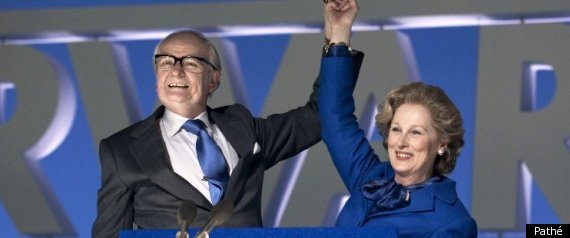
"Our character is our fate," says former British Prime Minister Margaret Thatcher to her physician in the new movie The Iron Lady, which comes out Dec. 30. "We become what we think. And I think I am fine."
Although Thatcher doesn't exactly turn out to be "fine" -- the movie's opening scene establishes the full extent of her dementia -- she's right about her character determining her fate. And it's Ms. Thatcher's character -- irresistibly charismatic, shrewd, ambitious, and (above all) maddeningly stubborn -- that makes The Iron Lady worth watching, if you can ignore its glib portrayal of Thatcherite England, which is glossed over about as blandly as if you were reading a middle-school textbook.
 Meryl Streep as Margaret Thatcher: victorious, as always
Meryl Streep as Margaret Thatcher: victorious, as always
The daughter of a grocery store owner in a small English town located just over 100 miles north of London, the young Thatcher is shown to be a social outcast but a diligent student who fights her way into Oxford and then into Conservative Party politics.
Thatcher is more than a little proud of her unlikely rise to power, and she doesn't hesitate to use it to her advantage at the slightest hint of dissent, lording it over anyone who questions her policies. "There are some here who have been given everything in life," she says to her all-male Cabinet, who had the gall to advocate lowering tax rates for the poor, "and who feel guilty for it." During her three terms as prime minister, Thatcher was a notorious advocate of public spending cuts, even if it meant taking free milk away from schoolchildren.
Progressives will likely take umbrage with the movie's glorification of Thatcher. Director Phyllida Lloyd and screenwriter Abi Morgan portray her as an underdog, someone who's widely ridiculed, doubted and misunderstood, and the snappy editing and musical crescendos that illustrate her rise to political prominence make her appear larger than life.
But Thatcher's hardline principles are shown in The Iron Lady to be hypocritical, too. When we see her pushing for a military attack on an Argentine Navy ship (which she ends up sinking, killing 323 crew members, to much controversy), she's told by her closest advisers that the country can't afford to go to war. "We shouldn't be worrying about money now," she says dismissively.
In The Iron Lady, Thatcher's self-righteousness is shown to be a force of nature, one that cannot be even remotely diminished by her closest friends or by the dozens of bombs that go off in protest of her policies, bombs that kill one of her closest advisers and that once nearly kill her and her husband, too. All this does is strengthen her resolve.
When she's accused of being "out of touch" with English society, we see her accurately quote the current market price of milk and produce to prove she's still connected with the middle class. In real life, Thatcher's priggishness was equally pervasive. When the Toxteth riots broke out in 1981 in black neighborhoods of Liverpool (the movie uses graphic archival footage from the event), after years of police beatings and mass arrests and unjustifiable stop-and-frisks, Thatcher notoriously claimed that unmowed lawns in the neighborhood were proof that the protesters had more "constructive things" to do "if they wanted."
But in the end, Thatcher's obstinacy becomes her downfall. We see her haunted by flashbacks, ignored by her country, left with a dead husband, an absentee son, and a doting daughter she seems not to care for. No matter how the movie glorifies her rise to power, her fate is the strongest indictment of her character.
